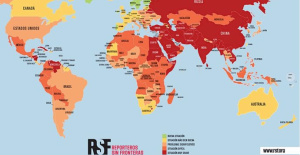MADRID, 10 Oct. (EUROPA PRESS) -
The Minister of Industry, Tourism and Commerce, Reyes Maroto, has underlined that the budget allocated to her department is the highest in history and will make it possible to strengthen the economic recovery, improve the competitiveness of the business fabric and advance and accelerate the modernization of the production model to adapt it to the double green and digital transition.
"A budget that also reinforces the protection of companies, especially in the sectors most affected by the rise in energy prices. In short, the largest budget in history in industrial, commercial and tourist matters with clear priorities in terms of sustainability and digitisation, and ambition for European and global leadership", highlighted Maroto.
Specifically, the budget of the Ministry of Industry, Commerce and Tourism for the year 2023 amounts to 10,031 million euros, 21.4% more than in 2022.
In industrial and SME matters, the budget reaches 7,234 million euros, 1,496 million euros more than in 2022, a growth of 26%. Of these, 4,214 million euros correspond to items from the Recovery, Transformation and Resilience Plan.
In the programs to promote industrial competitiveness and sustainability, the line of support for Strategic Projects for Industrial Transition (Perte) is endowed with 3,808 million euros (2,368 million euros in subsidies accompanied by 1,440 million euros in loans for mixed financing of programmes).
They also stand out in the promotion of competitiveness and industrial sustainability, 90 million euros to support digital transformation within the framework of the Activa Financing program, destined for innovation projects in terms of organization and processes, and additionally research and development, in thematic priorities related to Connected Industry 4.0 technologies, and 128 million for individual innovation and sustainability projects in key areas in the industrial transition such as energy efficiency, decarbonization, and new sustainable energy sources, the circular economy and eco-innovation, the improvement of value chains, among others.
The 2023 budgets also include 600 million euros to consolidate the financing lines through the Productive Industrial Investment Support Fund and at least 335 million to support the electro-intensive industry, of which 244 million correspond to the cost compensation mechanism of indirect CO2 emissions that can be increased with up to 25% of the income from auctions of greenhouse gas emission rights and 91 million for the reduction of charges for the promotion of renewable energy, high-speed cogeneration efficiency and extrapeninsular costs, in addition to the support of the Spanish Guarantee Reserve Fund for Electrointensive Entities.
In actions to promote SMEs, for actions and programs of entrepreneurship and growth, 121 million euros are allocated.
Likewise, to support entrepreneurship and business growth, the budget to support clusters through the Innovative Business Groups reaches 52 million, ENISA will have a budget of 104 million and CERSA increases its budget to 136 million.
On the other hand, Tourism budgets amount to 1,092 million euros, this being the third highest budget in its history.
Of these, 842 million correspond to items of the Recovery, Transformation and Resilience Plan, to continue, according to the Ministry, the path of modernization of the tourism sector.
For the transformation of the tourism model towards sustainability, the 501 million Tourism Sustainability Plans in Destinations stand out.
For special actions in the sphere of the sector's competitiveness, 10.6 million are allocated for the creation of the Comprehensive Tourism Sustainability System, 89 million for the maintenance and rehabilitation of historical heritage real estate, 50 million for the financing of circular economy and energy efficiency, 24.5 million for the development of associative entities in the field of tourist experiences and 10.7 million for Social Sustainability Plans in the tourism sector.
In addition, for the digitization and intelligence of destinations and the tourism sector, 10 million will be allocated for artificial intelligence applied to Tourism and 50.9 million for the Digital Transformation Plan in tourist destinations.
The tourism resilience strategies for the Canary Islands, the Balearic Islands and the two Autonomous Cities have a budget of 64 million.
In addition, the transfers to the Spanish Tourism Institute, Turespaña, amount to 9.45 million in the general budget and 11 million in the Recovery, Transformation and Resilience Plan.
Finally, the capital transfer is provided to the State Mercantile Society for the Management of Innovation and Tourism Technologies (Segittur) with 6.2 million, in order to influence "more intensely" the digital promotion of tourism in Spain , the promotion of innovation and knowledge and the consolidation of Smart Tourist Destinations.
Finally, the Trade area has a budget of 1,640 million for 2023, 143% more than in 2022, of which 1,199 million correspond to the credits of the Recovery, Transformation and Resilience Plan.
Among the actions to support trade, the Technological Fund for Trade stands out, endowed with 50 million, and the sustainable market programs for the modernization of commercial areas, the revitalization of rural areas through trade or the strengthening of commercial activity in areas of great tourist influx, endowed with 104 million.
In terms of the internationalization of trade, the mentoring and support program for Internationalization managed through the Official Chamber of Commerce, Industry, Services and Navigation of Spain, endowed with 13 million and 1,200 million in the endowments of the four assigned Funds, stands out. , the Fund for the Internationalization of Companies (FIEM) with 140 million and the Fund for Foreign Investments (FIEX) with 100 million, the Fund for Foreign Investment Operations of SMEs (Fonpyme) with 10 million and the Co-investment Fund with Sovereign Institutions, within the framework of the Recovery, Transformation and Resilience Plan, endowed with 950 million.
Lastly, transfers to ICEX Spain Export and Investment reach 137 million, earmarked for joint work that promotes the internationalization of companies and fosters the attraction of foreign investment.

 Exploring Cardano: Inner Workings and Advantages of this Cryptocurrency
Exploring Cardano: Inner Workings and Advantages of this Cryptocurrency Seville.- Economy.- Innova.- STSA inaugurates its new painting and sealing hangar in San Pablo, for 18 million
Seville.- Economy.- Innova.- STSA inaugurates its new painting and sealing hangar in San Pablo, for 18 million Innova.- More than 300 volunteers join the Andalucía Compromiso Digital network in one month to facilitate access to ICT
Innova.- More than 300 volunteers join the Andalucía Compromiso Digital network in one month to facilitate access to ICT Innova.-AMP.- Ayesa acquires 51% of Sadiel, which will create new technological engineering products and expand markets
Innova.-AMP.- Ayesa acquires 51% of Sadiel, which will create new technological engineering products and expand markets Spain moves from 36th to 30th place in RSF's world press freedom ranking but political pressure increases
Spain moves from 36th to 30th place in RSF's world press freedom ranking but political pressure increases Spain receives 16.1 million tourists until March and registers the best first quarter in history
Spain receives 16.1 million tourists until March and registers the best first quarter in history More than 2,000 arrested during pro-Palestinian protests at US universities
More than 2,000 arrested during pro-Palestinian protests at US universities Illa advocates for a "transversal" Government and Junts rules out agreeing with the socialists
Illa advocates for a "transversal" Government and Junts rules out agreeing with the socialists How Blockchain in being used to shape the future
How Blockchain in being used to shape the future Not just BTC and ETH: Here Are Some More Interesting Coins Worth Focusing on
Not just BTC and ETH: Here Are Some More Interesting Coins Worth Focusing on UPV students design an app that helps improve the ventilation of homes in the face of high temperatures
UPV students design an app that helps improve the ventilation of homes in the face of high temperatures Ivace and promotes a less invasive device for the early detection of prostate cancer
Ivace and promotes a less invasive device for the early detection of prostate cancer Valencia unanimously approves the ordinance to allocate spaces to test innovative initiatives
Valencia unanimously approves the ordinance to allocate spaces to test innovative initiatives UPV researchers promote a paid master's degree as a "talent factory" in integrated photonics
UPV researchers promote a paid master's degree as a "talent factory" in integrated photonics A million people demonstrate in France against Macron's pension reform
A million people demonstrate in France against Macron's pension reform Russia launches several missiles against "critical infrastructure" in the city of Zaporizhia
Russia launches several missiles against "critical infrastructure" in the city of Zaporizhia A "procession" remembers the dead of the Calabria shipwreck as bodies continue to wash up on the shore
A "procession" remembers the dead of the Calabria shipwreck as bodies continue to wash up on the shore Prison sentences handed down for three prominent Hong Kong pro-democracy activists
Prison sentences handed down for three prominent Hong Kong pro-democracy activists ETH continues to leave trading platforms, Ethereum balance on exchanges lowest in 3 years
ETH continues to leave trading platforms, Ethereum balance on exchanges lowest in 3 years Investors invest $450 million in Consensys, Ethereum incubator now valued at $7 billion
Investors invest $450 million in Consensys, Ethereum incubator now valued at $7 billion Alchemy Integrates Ethereum L2 Product Starknet to Enhance Web3 Scalability at a Price 100x Lower Than L1 Fees
Alchemy Integrates Ethereum L2 Product Starknet to Enhance Web3 Scalability at a Price 100x Lower Than L1 Fees Mining Report: Bitcoin's Electricity Consumption Declines by 25% in Q1 2022
Mining Report: Bitcoin's Electricity Consumption Declines by 25% in Q1 2022 Oil-to-Bitcoin Mining Firm Crusoe Energy Systems Raised $505 Million
Oil-to-Bitcoin Mining Firm Crusoe Energy Systems Raised $505 Million Microbt reveals the latest Bitcoin mining rigs -- Machines produce up to 126 TH/s with custom 5nm chip design
Microbt reveals the latest Bitcoin mining rigs -- Machines produce up to 126 TH/s with custom 5nm chip design Bitcoin's Mining Difficulty Hits a Lifetime High, With More Than 90% of BTC Supply Issued
Bitcoin's Mining Difficulty Hits a Lifetime High, With More Than 90% of BTC Supply Issued The Biggest Movers are Near, EOS, and RUNE during Friday's Selloff
The Biggest Movers are Near, EOS, and RUNE during Friday's Selloff Global Markets Spooked by a Hawkish Fed and Covid, Stocks and Crypto Gain After Musk Buys Twitter
Global Markets Spooked by a Hawkish Fed and Covid, Stocks and Crypto Gain After Musk Buys Twitter Bitso to offset carbon emissions from the Trading Platform's ERC20, ETH, and BTC Transactions
Bitso to offset carbon emissions from the Trading Platform's ERC20, ETH, and BTC Transactions Draftkings Announces 2022 College Hoops NFT Selection for March Madness
Draftkings Announces 2022 College Hoops NFT Selection for March Madness



























